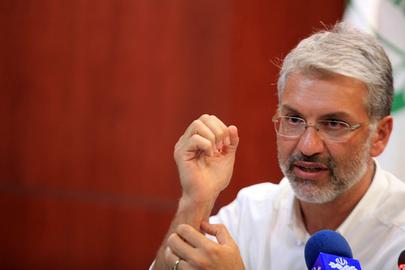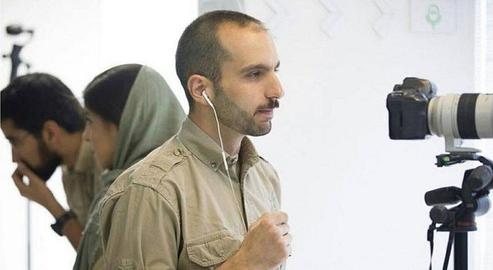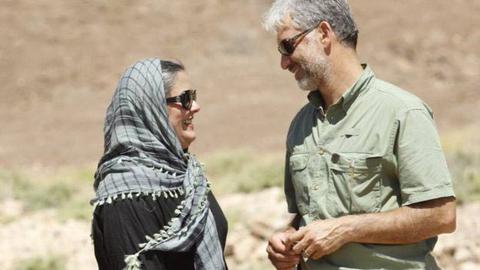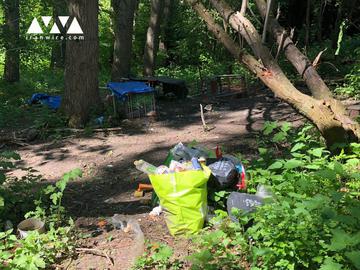Eight jailed environmentalists have faced torture, harsh interrogations and been pressured to confess to spying, IranWire has learned.
“Last year during interrogations, in order to pressure Sepideh Kashani and force her to confess, the interrogators told her that her husband, Hooman Jokar, had been murdered in prison,” a source close to one of the environmentalists told IranWire. “When she ignored them, they showed her Hooman’s bloody shirt. In response, Sepideh went on hunger strike and told them she wouldn’t stop until they let her see him, or show her his body. During the strike, she lost 30 kg. After she was assured that his murder was a lie and they let them meet, she broke her strike. The media did not cover the hunger strike.”
The source told IranWire that Revolutionary Guards intelligence agents had used torture in an attempt force the activists, who had campaigned for the protection and preservation of Iran’s wildlife, to prepare a written confession — a scenario that resembles that experienced by Mazyar Ebrahimi, who told IranWire in mid-August that he had been tortured and forced to confess to the murder of nuclear scientists.
One of Hassan Rouhani’s vice presidents and a member of parliament are among those who have called for the activists to be released.
“The administration concludes that these activists should be released because there is no evidence to prove the charges against them,” said Isa Kalantari, who heads the Department of the Environment. Parliamentarian Mahmoud Sadeghi tweeted: “According to reports, the head of the Supreme National Security Council reviewed this case and has stated that these suspects did not commit espionage.”
But Kalantari has refrained from speaking to the media and answering campaigners’ requests for updates for more than a year, and has urged the media to not report on the matter, which has become known as the “Parsian” case. He told reporters: “It’s better not to write anything about the environmental activists. We’ve been told that they will be better off if there is less media coverage.”
He added that the administration was unable to taking any further action on the case. “People who are taking care of this case are very powerful and did not reply to questions from the administration committee.”
“We Won’t Be Silent”
Despite these appeals to the press, Katayun Rajabi, whose brother Sam is one of the eight jailed activists, talked to IranWire about the case. She said that two of those jailed, Niloofar and Sepideh, had gone on hunger strike from August 3 until August 11 in protest against the conditions they were being held in, and the illegal nature of their arrest and detention. They stopped striking after some of their demands regarding prison conditions were met and they were allowed to come out of their cells for fresh air and telephone their families three times a week.
“Niloufar told them that they should let all eight of them enjoy these rights, but the interrogators told her she can only demand things for herself. Why is she even bothering to ask for others? She replied that they had made her wrongfully confess to lies they had dictated to all of them. Now I ask you to provide us with basic rights.”
Rajabi, who lives in Germany, is one of the few family members of the jailed activists who is still willing to talk to the media.
Katayun Rajabi added that prison officials failed to honor the promises they made to prisoners and also told them they had to write down any requests they wanted to be reviewed. She also stated that her brother’s situation was a little different than the other detainees. “Unlike others, Sam can call his mom (Sam and I are half-siblings from the same father but different mothers) at a set hour every day and talk for five minutes. As far as I know, nobody else can call their families and meetings are once every three weeks for everyone else.”
The activists have not yet been transferred to the general ward of the prison, which is unprecedented in this type of case. As a result, it has been difficult to obtain an assessment of their situation. Katayun Rajabi says that, as far as she knows, Sepideh Kashani and Niloufar Bayani are being held in cells next to each other and she believes that Morad Tahbaz and Abdolreza Kouhpayeh are cellmates. “We don’t know much about the others,” she said. “But I’ve heard that, other than Sam, they are being held in groups of two. Apparently, Sam is completely separated from the others and they don’t even see him during fresh air time.”
Rajabi says she has no idea of her brother’s exact location, who his cellmates are, what size cell he is in, or whether he is being held in solitary confinement. “Because of his mother’s struggle with cancer, Sam does not talk about prison much and tries to be super positive,” she says. “During these 19 months, we haven’t heard him complaining even once other than the fact that we know he suffers from stomachache. But we have no information on any other possible harassment.”
Rajabi is not sure whether she and her mother’s decision to speak out about the case has helped his situation or made it possible for him to have daily phone calls. “But I know that I will never be silent, not now, not ever. Because I believe my brother is innocent and was arrested for no reason. He is imprisoned on no legitimate basis and many laws have been broken already with respect to his illegal arrest and detainment. I always said and will say this, which has also been confirmed by his lawyer. We won’t be silent.”
Ordered to Appoint a New “Approved” Lawyer
In February, Judge Abolghasem Salavati reportedly told Sam Rajabi that he could no longer have Mohammad Hossein Aghasi as his lawyer, but he rejected this, confirming it with his mother. “It was February 9 or 10, a few days before the court date. Sam called and said to his mom that he’s being told he will be released and he does not need a lawyer. They said he needs to get rid of his lawyer in order for him to be released a few days later. But it was clear that they were lying. A little later, in July, when they were given court dates, they told him that Judge Salavati had chosen a judiciary- approved lawyer, Mr. Daryabeigi, and that he would be his will be his public defender.”
Katayun Rajabi says it’s not clear if her brother met with that lawyer or not. Either way, she says, the lawyer he appointed has no access to his case files. In October 2018, Aghasi managed to negotiate a term with the prosecutor, cancel the espionage charge and limit the charges to “conspiracy against national security” and “cooperation with enemy nations”.
But Rajabi’s sister says that in February, when the first round of trials got underway, Aghasi was not officially notified. Although he is her brother’s attorney by law, he was not able to defend his client in court. “We were the only family who did not know about the court date. Mr. Aghasi was removed from the case, although he never officially received such a document.”
Prior to this, a former prisoner had told IranWire about the psychological torture carried out against environmental activists. We asked Katayun Rajabi about the possibility that her brother had been tortured. She says he was in a very bad mental state the first time he met with his mother. “He was worried about me a lot , which is because they probably scared him by telling him lies about me. Perhaps they said I came back and was arrested and am in danger. But when his mother told him I’m okay, he calmed down.”
She said that her brother lost a lot of weight, and had been shivering during the visit, and also that he had trouble walking.“In the next meeting, his nose had been injured, but we don’t know how. But at the next meetings, he seemed better.”
IranWire’s source said this was a regular tactic used by interrogators. “This method where they make you believe they have one of your loved ones and that they are being tortured is being used frequently in this case. And of course, [environmental activist] Kavous-Syed Emami’s murder in prison [in February 2018] makes these bluffs seem way more real.”
Because of the families’ silence, there is less information about the other prisoners in the Parsian case.
Surveillance, Pressure and No Access to Medication
The person IranWire spoke to also talked about the interrogation of Sepideh Kashani, and that she was tortured by showing her a bloody shirt of her husband, Hooman Jokar, who the source says is currently very mentally unwell. “Hooman, who is usually very optimistic and hopeful, now believes there is no justice and nobody can do anything for him.”
The person IranWire spoke to also talked about the interrogation of Sepideh Kashani, and that she was tortured by showing her a bloody shirt of her husband, Hooman Jokar, who the source says is currently very mentally unwell. “Hooman, who is usually very optimistic and hopeful, now believes there is no justice and nobody can do anything for him.”
In 2018, news emerged that Niloufar Bayani, one of the suspects in the case, had been charged with “spreading corruption on Earth” and that, two days on from the announcement security agents took her, blindfolded but wearing her own clothes and not a prison uniform, to have her hair cut and make-up done. Later, she was taken to a shopping mall and to a villa in Lavasanat to relax. However, Bayani knew she was being watched and said that she realized she had been being filmed when she was in the bathroom But she refused to play by the game and when she was in the bathroom, she noticed that someone was filming her secretly.
According to IranWire's source, there is very little information available about one of the other detainees, Abdolreza Kouhpayeh. “His family took a very strange position, a position that I consider to be dangerous and [that amounts to] cooperation with the intelligence agencies,” the source said. “Their loved one has being tortured like everyone else for such a long time, but they decided to stay silent. Even after the first media coverage, they complained to other families, asking why his photograph and and name had been published.”
The mother of another activist, Taher Ghadirain, has spoken a little on her son’s case. She says he is suffering from a problem with his thyroid and has a persistent toothache. When he was first detained, he was given medicine, but recently his mother, Fezzeh Anari, told Ensaf News: “He hasn’t had his medicine for two months. They told him they'll take him for medical tests in early September and get new medicine. But his situation is getting worse and his suffering from new problems with his liver and his vision.”
The source IranWire spoke with said problems with vision were common among the detained environmental activists. “Most of the arrestees are suffering from vision problems because of the long time [19 months] in solitary confinement, lack of light, and lack of enough fresh air.”
Another inmate, Morad Tahbaz, has cancer, and his situation is reported to have got worse. Like Ghadirain, he has been denied medication and been tortured to such an extent that he agreed to confess to a dictated confession. “But they cut off his access to medicine again,” the source said. “It appears as though intelligence officers want Morad dead.”
The Revolutionary Guards Corps agents are reportedly pressuring Tahbaz to surrender his families’ properties. “His father used to have a lot of land in Iran in various nice neighborhoods, many of which were confiscated after the revolution. His family was able to exchange some of this land in 2016 for new properties. Since then, Morad had been following up on promises to get some of their land back.”
The land the family owned was close to Touran National Park, according to a Tasnim News Agency article by Shadi Modarres, citing intelligence agent reports. The article claimed that Morad hoped to reclaim part of the park for his family. Not long after it published the news, Tasnim removed the story from its website.“This was a completely false accusation,” IranWire’s source said. “But they removed it [the story] only because it was exposing the Revolutionary Guards’ plans. Apparently, they want to claim that Tahbaz family is related to the Qajar dynasty and that they are also a pro-Pahlavi family, since his father was in the parliament before the revolution and [authorities] confiscated all their properties following Article 49 of the constitution regarding properties belonging to those who were anti-revolution.”
And yet, while Rouhani’s administration has admitted these people are innocent, their families’ reluctance to give interviews with the media — and, in the case of Abdolreza Kouhpaye, their total silence — has been one of the most shocking aspects of this case. More often than not, the families of the arrestees will give interviews with the media shortly after an arrest or, at most, a few months later, when they discover the promises they were given for being silent were lies. But in this case, even after 575 days, nobody other than Sam Rajavi’s mother and sister and Mohammad Hossein Aghasi, his lawyer, has given interviews to the media.
“They summoned every family member and lawyer, one by one, and warned them not to give interviews to the media about the case, [and said if they did] they will be arrested as well,” IranWire’s source said.
However, there have been a few instances when the families have been alarmed about news concerning their loved ones and given brief interviews to domestic media, which are restrained and monitored. “Some of the close relatives of these kids live outside the country and I don’t know why they, like Katayun Rajabi, don’t give interviews and remain silent,” said IranWire’s source.
However, there have been a few instances when the families have been alarmed about news concerning their loved ones and given brief interviews to domestic media, which are restrained and monitored. “Some of the close relatives of these kids live outside the country and I don’t know why they, like Katayun Rajabi, don’t give interviews and remain silent,” said IranWire’s source.
Katayun Rajavi says her brother Sam’s mother was the first person to be interviewed on the case and since then has been heavily involved. “No further threat was imposed upon Sam or anybody else because of his mom’s interviews. Practically, he gained daily phone calls with his mom.”
Sam Rajavi’s regular phone calls from his mother are crucial, since suffers from cancer. “When his mom was hospitalized because of a relapse, I heard one of the recorded phone calls that he made. He was very anxious in that call and was crying since he was dead worried about his mom’s situation,” the source told IranWire. “His mom suffers from cancer and weights only 27kg, she has nobody but Sam. The only thing that made Sam feel better was the fact that his friends were looking after her. But in general, for his mom’s situation, he tries to appear good and positive during the meetings so she won’t suffer anymore. More than anything, he asks about his mom’s situation and health during their meetings.”
Many of the jailed activists’ families have written letters or met with Iranian officials, asking them to do what they can to ensure their loved ones are released. Katayun Rajavi wrote directly to President Hassan Rouhani, but has been frustrated with the lack of response.. “It’s been 14 months since I sent an open letter to Rouhani and I have not received an answer. Mr. Rouhani has not mentioned this case even once. Families have visited the Supreme Leader’s office but were told that the case had nothing to do with the Leader. They appealed to Shahindokht Molaverdi, Rouhani’s aide for citizens' rights, but she also said she can’t do anything. [Justice Chief] Mr. Ebrahim Raeesi also told everyone they had to wait for the judge’s ruling.”
Rajavi has turned for help outside Iran, and has appealed to German officials including Green Party politicians. She also wrote to Germany’s Human Rights Commissioner, Barbel Kofler. “She responded to me that even before my letter, she asked the Iranian government about this but did not get a clear response. A little later, she wrote again and said the government sent her a letter admitting that in their eyes the environmental activists involved in the wildlife case, aka Parsian, including my brother Sam, are totally innocent, but they said that currently the issue is out of their hands.”
She drew comparisons between the case and that of the suspects accused of murdering Iranian nuclear scientists, and says that reading reports and watching recent videos posted online about the story has made her think more about the two cases. “There is an important difference,” she said. “Back then there were unsolved murders that they needed a scenario for, but this time there is no victim.”
Her brother and the other activists are serving long jail terms based on no evidence, she said. “There is absolutely nothing in this case against them. Even the intelligence ministry confirmed this. But the competition and fight between two organizations in the Islamic Republic have made these kids their victims. Since they don’t have any evidence against them, they hold the trials in secret. The second round of hearings was announced to families and attorneys only a few hours before they started.”
visit the accountability section
In this section of Iran Wire, you can contact the officials and launch your campaign for various problems





























comments